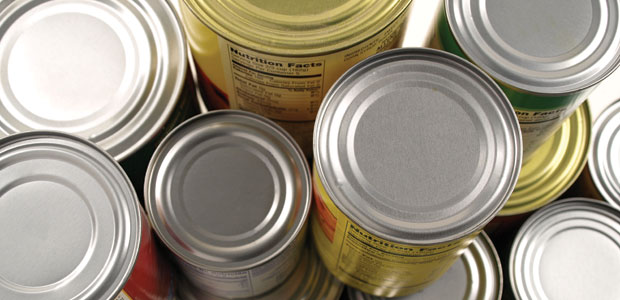Advertisement
BPA for Dinner?
It's toxic, but it's still in our food

You won’t find many tinned foods in Rick Smith’s pantry. That’s because the executive director of Environmental Defence Canada and the father of two young kids is all too aware of the health hazards of bisphenol A (BPA).
Found in the lining of countless food and beverage containers—including those geared specifically to children—BPA is a synthetic chemical that’s been linked to breast and prostate cancer, among other health problems.
What it’s used for
Also called 2,2-bis(4-hydroxyphenyl) propane, BPA is a component of epoxy resins, which are used in everything from sports helmets to car parts. In the protective linings of metal lids and containers for foods and drinks, including those for beer, soft drinks, infant formula, baby food, vegetables, fruit and ready-made meals, it prevents the corrosion of metal and the contamination of food from dissolved metal, and helps preserve food.
However, the fact that BPA is still found in food tin linings in Australia is striking, since the federal government announced the voluntary phase out by major Australian retailers of plastic baby bottles containing BPA in June 2010.
BPA is not necessary
“The no-brainer of BPA continues to be that it’s not necessary”, says Smith on the line from Environmental Defence, a nonprofit organisation based in Toronto. “You can easily make baby bottles without this chemical, and you can easily make tinned foods without this chemical.
“BPA is one of the most commonly man-made chemicals in the world; billions of pounds of this stuff are made ever year”, he says. “It’s ubiquitous. But the application where it’s really a problem is when it’s made into food and beverage packaging. When it comes in contact with food or drink, then leaches in those items, it’s ingested.”
The evidence
As well as certain types of cancer, BPA has been associated with increased risk of cardiovascular disease, miscarriages, reproductive dysfunction, diabetes and neurological and behavioural disorders.
Pregnant women, infants and young children are most vulnerable to the harmful effects of BPA.
In 2010 consumer advisory group Choice sampled 38 tinned foods to determine levels of BPA. Thirty-three of the samples contained some BPA, from major brands of baby food, baked beans and olive oil to spaghetti, tomato soup and tuna. Choice noted, as a particular concern, the high levels of BPA found in some of the tinned baby and infant foods.
However, federal regulatory body Food Standards Australia New Zealand (FSANZ) disputes the Choice results, saying a nine-month-old baby weighing 9 kg would have to eat more than 1 kg of tinned baby custard containing BPA every day to reach the TDI, assuming the custard contained the highest level of BPA found (420 parts per billion).
The official position
The federal body recently undertook a survey and found no detectable levels of BPA in infant formula, including infant formula made in BPA-containing bottles, concluding that “BPA concentrations in food and drinks do not pose a health risk to Australian consumers”.
But FSANZ also recognises that consumers are concerned about the safety of BPA in foods, particularly the safety of food consumed by infants.
Australia’s regulatory bodies, including FSANZ and the Australian Competition and Consumer Commission (ACCC), believe the overwhelming weight of scientific opinion shows no human health and safety concerns at the levels people are exposed to.
However, they have pledged to continue monitoring the situation, with the ACCC noting that, if future studies show a risk to human health and safety, then they have “the power to ban products or develop mandatory standards with compulsory safety requirements that products must meet to minimise risks”.
Concern for kids
As Smith puts it, kids are not little adults. In fact, they’re particularly susceptible to the consequences of toxins. Children’s exposures begin at conception, when chemicals such as BPA cross the placenta in a pregnant woman’s body and can affect the embryo or foetus during critical periods of development.
“Kids are susceptible because their brains are developing, their cells are dividing”, he says. “There are any number of growth processes going on in their body that are very prone to being disrupted by synthetic chemicals.”
Disruptions to their hormonal systems during development can set the stage for later-life diseases such as breast cancer and prostate cancer.
“It’s very important that kids in particular are shielded from as much pollution as possible. There are hundreds of different hormonally active chemicals floating around the environment, all of which have some biological effect in our body; BPA is only one of them. That’s why eliminating BPA in tins is so important.
“The bad news is we’re all being exposed. The good news is we can easily pinpoint the problem. The solution is a no-brainer, so we need to get to it, because BPA is only part of a much larger picture.”
Global effortsto ban BPA
Around the globe the push to ban BPA in food and beverage containers is growing.
Japan
Japan has made concerted efforts to reduce BPA exposure. In response to consumers’ demands, industries there voluntarily lowered the use of BPA dramatically between 1998 and 2003. “Consequently, we see lower levels of BPA in the Japanese population”, Smith notes.
United States
Several states in the US have passed bills banning BPA. “Some North American food manufacturers are taking voluntary steps to use alternatives to BPA because of consumers’ concerns”, Smith adds.
Industry-driven change
Even in advance of government regulation, major manufacturers are changing their practices”, Smith says. “They’re ahead of the curve.” Substitute linings include polyester-based linings, such as thermoplastic polyester coatings or plant oil-based linings. Packaging such as glass and Tetra Pak cartons are also free of BPA.
Smith is optimistic that our food supply will soon be BPA-free.
“I have no doubt that within a few years BPA is going to be out of food tins”, Smith says. “The writing is on the wall.
“We always suggest people act as informed consumers and as informed citizens as well”, he adds. “It’s important that decision makers hear from people who have concerns about these things.”
Email the Parliamentary Secretaryfor Health (mark.butler.mp@aph.gov.au) asking for better restrictions, because ultimately it’s better regulation that’s needed here.
“We shouldn’t have to be chemical engineers when we go shopping”, Smith says.
Keeping BPA out of your kitchen—and your kids
- Reduce tinned food intake (or seek out tins labelled BPA free).
- Note that some tinned food products are worse than others: the highest levels of BPA are in coconut milk, soups, meats, vegetables, meals (such as pasta dishes), beans, tinned juices and tinned fish.
- Choose fresh or frozen fruits and vegetables instead of tinned varieties.
- Look for products that don’t use BPA in their containers; companies that are using alternatives are likely to advertise this on their labels.
- Check the plastic containers you use at home: although the ID code is voluntary, you should avoid those with the symbol 3 (PVC) or the number 7 (a catch-all category that includes BPA) on them.
- Contact food manufacturers directly, and ask them to use alternatives to BPA.





